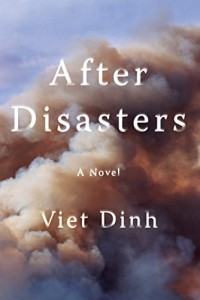#31 After Disasters by Viet Dinh
Apart from having one of the best covers I have seen in recent years, Viet Dinh’s debut novel was a thoroughly enjoyable read, to me, for three reasons:
- It explores gay male life without explanations, without apology and without titillation
- The topic – aid workers and disaster recovery – is one that I know a little bit more about than the average person and it’s a great subject for a novel
- The setting – Gujarat – is beautifully handled, with a feeling vaguely reminiscent of Ruth Prawar Jhabvala’s Booker winning Heat and Dust.
Four men, Ted, Piotr, Andy and Dev, are brought together by an earthquake. Ted, a former medicine salesman and his new colleague Piotr are part of a Disaster Assistance Response Team. Andy, a firefighter, finds boarding the plane for his first mission ‘like boarding a can of spray paint: he’s the little metal ball rattling around inside’ and Dev is already on the ground; as a doctor, he’s both uniquely placed to help the survivors and profoundly affected by their plight and the problems experienced by the aid teams whose attempts to help are often counterproductive and sometimes personally dangerous.
While the me n are geographically proximate, they are both mentally and emotionally distant. Piotr and Dev have lives that are constructions, like the collapsed constructions that Andy must dig through in an attempt to find survivors. Both have wives, but their reasons for marrying are quite different – Dev has wanted a wife as an aspirational feature of a good life while Piotr marries to save a Bosnian translator from being left behind in a war zone. Both are torn between their intellectual understanding of ‘life’ and a visceral need to take risks to feel alive. Piotr, a seasoned survivor of disaster relief work, shuts down his life when he leaves home and returns to it when the disaster is over. Why? We never really find out, but maybe just because he is capable of doing so and his exposure to eager but useless ‘helpers’ who complicate and interfere with rescue attempts makes him feel obligated to bring his professionalism to each desperate situation.
n are geographically proximate, they are both mentally and emotionally distant. Piotr and Dev have lives that are constructions, like the collapsed constructions that Andy must dig through in an attempt to find survivors. Both have wives, but their reasons for marrying are quite different – Dev has wanted a wife as an aspirational feature of a good life while Piotr marries to save a Bosnian translator from being left behind in a war zone. Both are torn between their intellectual understanding of ‘life’ and a visceral need to take risks to feel alive. Piotr, a seasoned survivor of disaster relief work, shuts down his life when he leaves home and returns to it when the disaster is over. Why? We never really find out, but maybe just because he is capable of doing so and his exposure to eager but useless ‘helpers’ who complicate and interfere with rescue attempts makes him feel obligated to bring his professionalism to each desperate situation.
The men collide and interact – some, like Ted and Dev, are already known to each other. Others, like Andy, are novices both at disaster management and at masculine relationships. It is Andy who struggles most ‘like when he sneaks out of a stranger’s flat, or when he kicks a stranger out of his own flat: No offense, but I have trouble sleeping with somebody else in my bed’ – alienated from some of his colleagues, desperate to prove himself and shocked by some decisions that must be made in disaster zones, he is both fragile and covering it up with bravado and rapidly erupting anger.
Moving around in time, and shifting in perspective, the novel is a deft handling of multiple experiences of a truly life-changing, and death-bringing, experience. Whilst opening as a series of vignettes, rather like linked short stories, the narrative rapidly converges around the four men and around Bhuj as the centre of an earthquake, but the real thrust of the story is about the nature of disaster and how we all experience it, whether on the ground or through broadcast media. In a way, we are all victims now.


Recent Comments